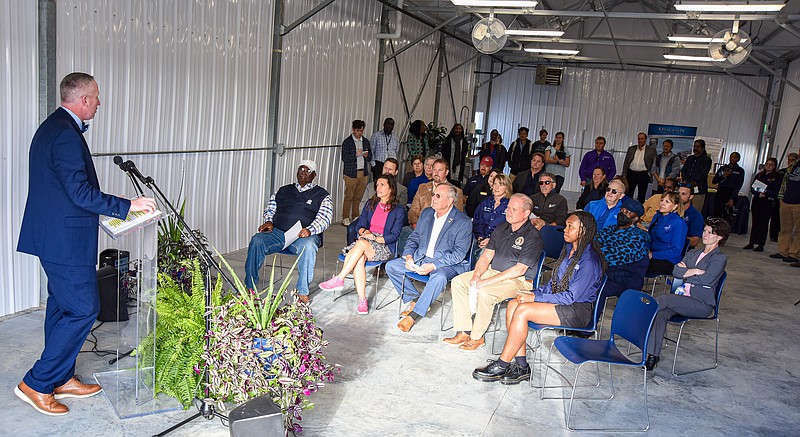Lincoln University's land grant funding is cultivating growth on its campus farms and throughout the state.
The historically Black university received nearly $10 million in land grant funding from the state this year, which is used as a match to draw down additional funding from the U.S. government. It was the first time the General Assembly fully funded the match since it became a federal requirement more than 30 years ago.
If Mid-Missouri lawmakers have their way, it won't be the last.
"I think we're a result-based Legislature. I think when we're seeing something that's happening and it's working, I think we can throw more money into it and we can give them the land grant money that they deserve, that they haven't gotten for so long," said Rep. Dave Griffith, R-Jefferson City. "We have a lot of catching up to do. The state of Missouri owes Lincoln University a lot of money. I'm talking millions of dollars that they have not gotten that they should have gotten, and I think the appetite for it in the House right now and the Senate is bipartisan."
Lincoln hosted state representatives and local leaders Wednesday for a ribbon-cutting ceremony at George Washington Carver Farm, followed by a tour of new farm facilities.
Lincoln has invested about $4.5 million to build two greenhouses, a high tunnel and a workhouse at Carver Farm, as well as three greenhouses, two high tunnels and a workhouse at Alan T. Busby Farm. The ribbon cutting celebrated the opening of the newly constructed facilities.
In the works are two more farm facilities worth about $6 million, which Lincoln plans to develop during the next two years. One is a small ruminant processing facility and the other is a hemp testing facility, both of which are slated for James N. Freeman Farm.
The university Board of Curators also approved the purchase of a $162,500 building in Charleston, Missouri, at its Sept. 28 meeting. The building will house an agriculture extension office and the nearly one acre of accompanying land will be used for a community garden.
The existing extension office in Charleston became too small for operations, university administrators said, and the new 15-year-old building, located at 305 Cooper St., will allow operations to expand.
Lincoln's farm developments have been heavily supported by state and federal funding. As an 1890 land grant institution, the university is eligible for up to $17.3 million in combined state and federal funds each year to exclusively support agriculture research, teaching and extension programs.
"We are getting started," farm manager Christopher Boeckmann said. "But I do not believe our journey is near finished."
Griffith said he's "all in" for anything he can do to support Lincoln in the General Assembly, calling it one of the best-kept secrets in Jefferson City and the state of Missouri.
Griffith, who is running for re-election, said he will stand hand in hand with Democrats in the House to ensure Lincoln receives its full land grant funding from the state if retained. He said the university has been a good steward of state dollars.
Rep. Willard Haley, R-Eldon, was also present for Wednesday's ribbon cutting and said he plans to continue offering support for Lincoln's land grant funding.
Haley was an agriculture teacher at Eldon High School for 25 years, which he said often brought him into contact with Lincoln's agriculture programs. He said it was beneficial to expose high school students to college-level agricultural studies.
"We have to be looking at the future and the new innovations in agriculture, and it's fantastic that Lincoln University is on the cutting edge of this new development and this new technology," Haley said. "And they need to continue that because we look for universities to be the leader when it comes to this kind of new innovation."
Sen. Mike Bernskoetter, R-Jefferson City, helped secure the university's funding last session and said he's willing to champion it again in January.
Bernskoetter said the state's record of underfunding the historically Black university's land grant mission hasn't been appropriate.
"I think it's a good thing we got them where they should be and hopefully we can continue to do that," he said.
"Dr. Moseley's done a fantastic job of connecting with the Legislature and the governor and the lieutenant governor, and I think with his leadership the new (Senate) appropriations chair will continue to fund Lincoln University," Bernskoetter continued.
While the Legislature was in session, University President John Moseley said conversations about Lincoln's land grant funding had been floating around for years, but only recently did lawmakers start understanding the value LU Cooperative Research and Extension provides to Missouri farmers and the agriculture industry.
LU extension serves about 47 counties throughout Missouri with a variety of agriculture resources and information. The university is a national leader in industrial hemp research and offers programming related to gardening, small ruminant animals (like sheep and goats), aquaculture, and crop pest and disease management.
Haley said he wasn't aware of the state neglecting Lincoln's land grant appropriation until Moseley visited him last session.
"He educated us in how it was lacking and lagging behind," he said. "To me, that was a priority to make sure we increase our funding to where it should be and with the state of Missouri's financial situation the way it is, I would like to see that continue."
Moseley thanked lawmakers for supporting Lincoln's land grant mission during the most recent legislative session, which ended in May.
"Land grant funding ensures opportunities are shared in an equitable manner for minorities in education, and LU remains committed to fulfilling our mission and responsibility of supporting rural communities and making a global impact through our research and outreach," he said.
"We're doing tremendous things throughout the state in this area, including feeding trials for small animals," he continued. "The outcome of these trials and soil studies will help different regions of our great state, from the northwest to the Bootheel."
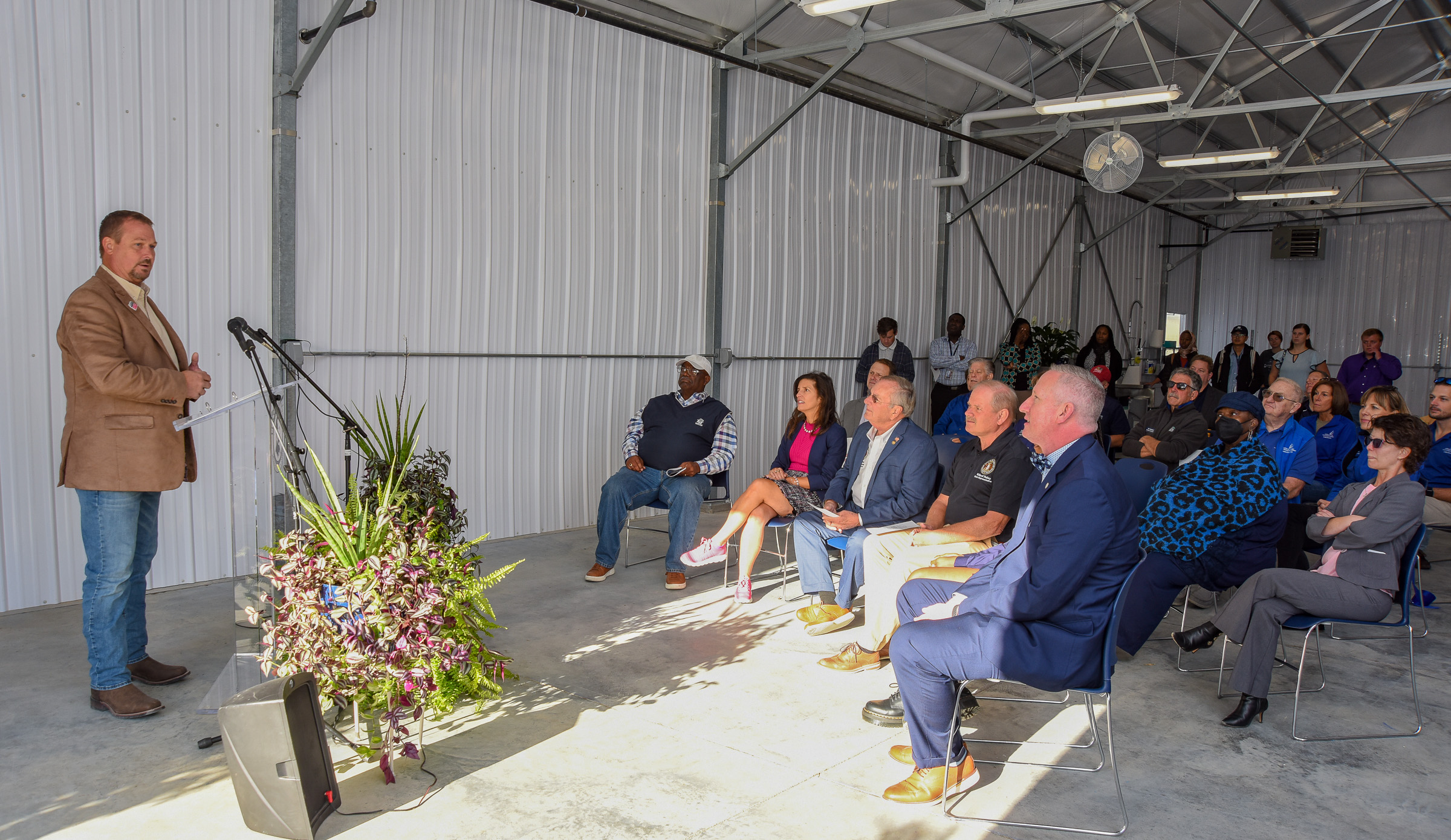 Julie Smith/News Tribune photo: Cole County Eastern District Commissioner Jeff Hoelscher addresses Lincoln University President John Moseley, seated near, area elected leaders LU staff, faculty and curators who were in attendance at Wednesday's Carver Farm ribbon-cutting ceremony. Hoelscher is a graduate of Lincoln and expressed gratitude about the learning environment at the university.
Julie Smith/News Tribune photo: Cole County Eastern District Commissioner Jeff Hoelscher addresses Lincoln University President John Moseley, seated near, area elected leaders LU staff, faculty and curators who were in attendance at Wednesday's Carver Farm ribbon-cutting ceremony. Hoelscher is a graduate of Lincoln and expressed gratitude about the learning environment at the university.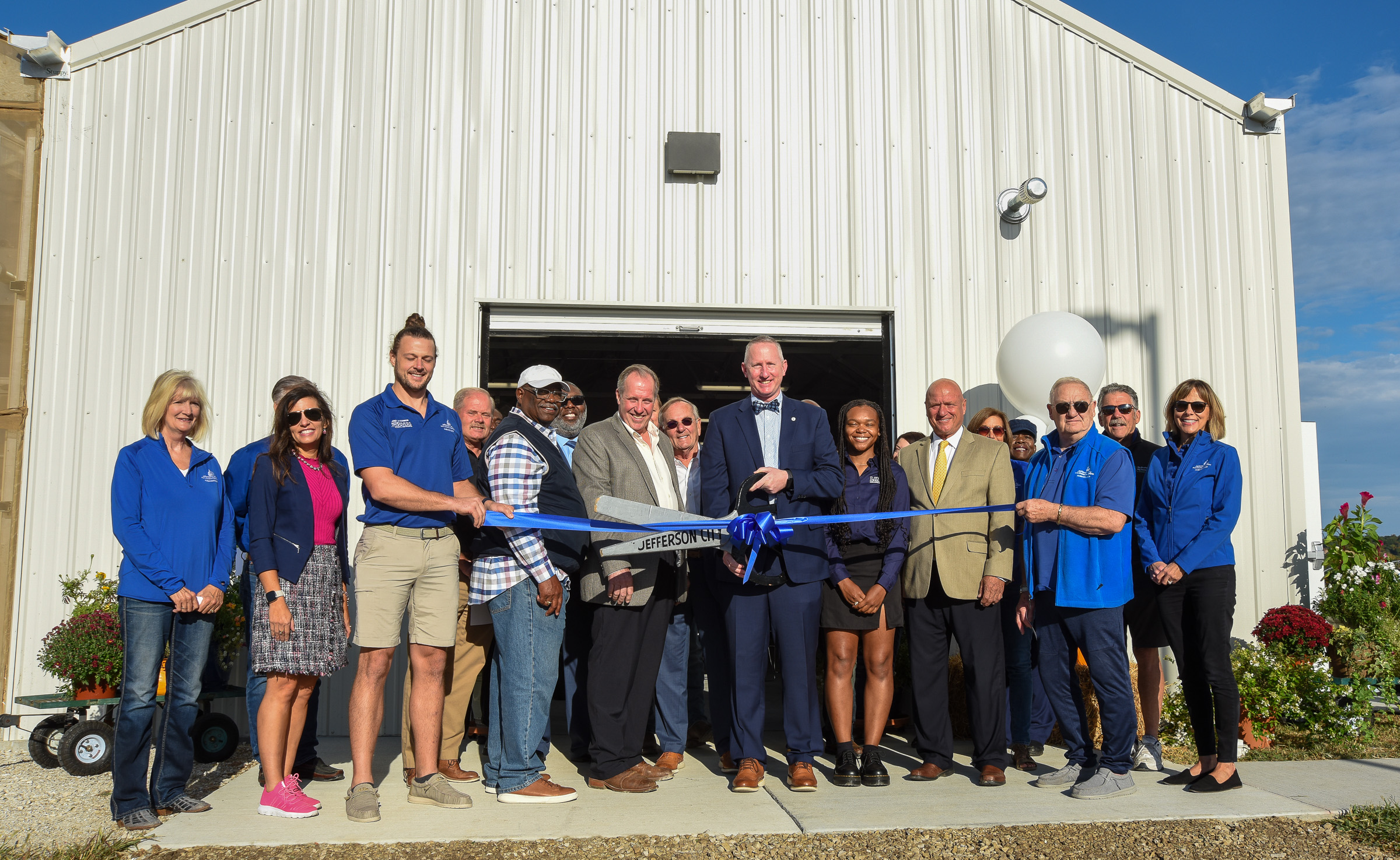 Julie Smith/News Tribune photo: Lincoln University President John Moseley holds the scissors during Wednesday's ribbon-cutting ceremony at George Washington Carver Farm on Bald Hill Road. Moseley was joined by LU staff, curators, area elected leaders and the Chamber Ambassadors for the morning festivities.
Julie Smith/News Tribune photo: Lincoln University President John Moseley holds the scissors during Wednesday's ribbon-cutting ceremony at George Washington Carver Farm on Bald Hill Road. Moseley was joined by LU staff, curators, area elected leaders and the Chamber Ambassadors for the morning festivities.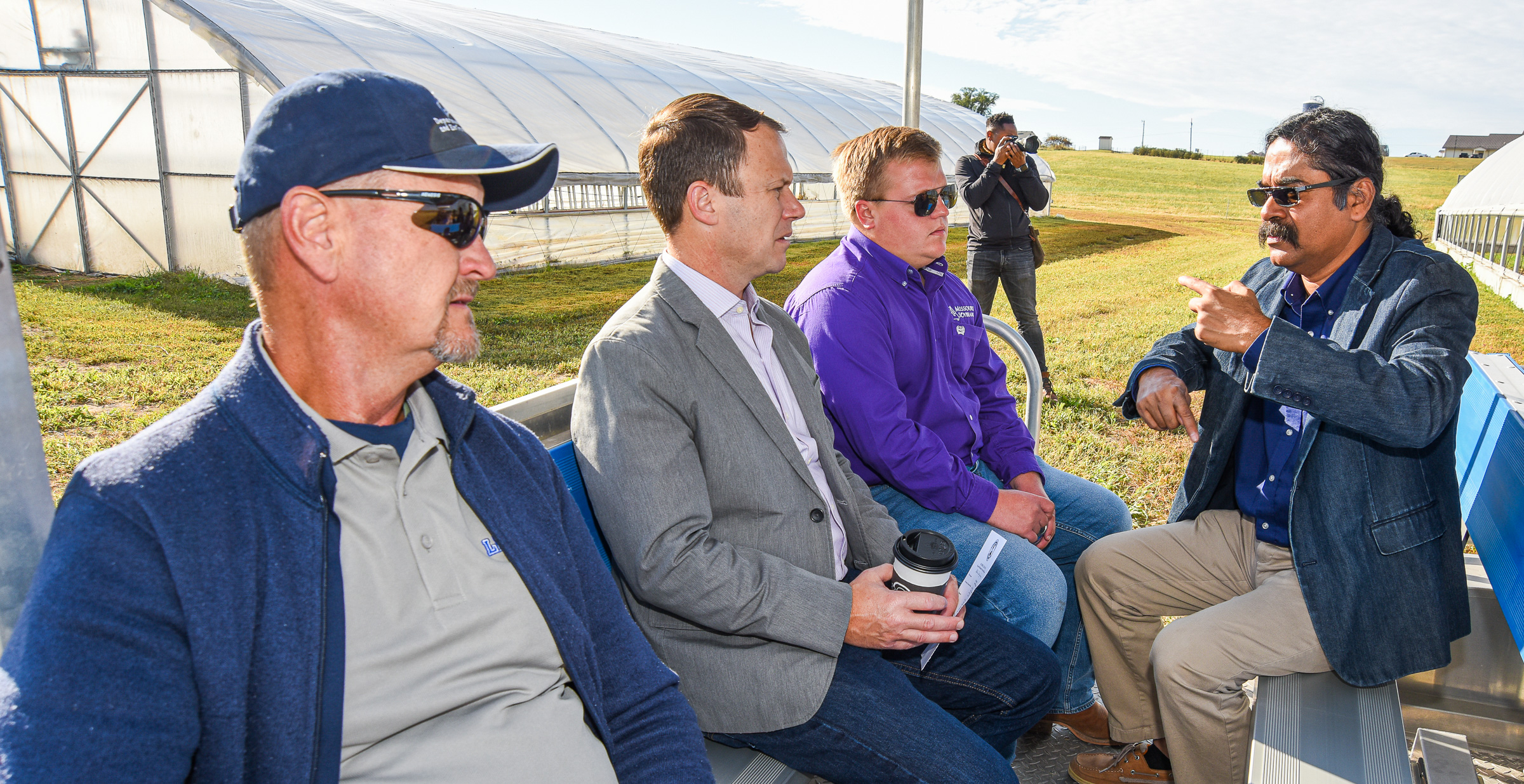 Julie Smith/News Tribune photo: Prof. Babu Valliyodan, at right, explains the many uses of industrial hemp to Busby Farm Manager Dennis Davis, near, Davin Althoff, with Missouri Farm Bureau and Dylan Anderson of the Missouri Soybean Association as they tour Carver Farm Wednesday morning, Oct. 5, 2022, following a ribbon cutting of new facilities.
Julie Smith/News Tribune photo: Prof. Babu Valliyodan, at right, explains the many uses of industrial hemp to Busby Farm Manager Dennis Davis, near, Davin Althoff, with Missouri Farm Bureau and Dylan Anderson of the Missouri Soybean Association as they tour Carver Farm Wednesday morning, Oct. 5, 2022, following a ribbon cutting of new facilities.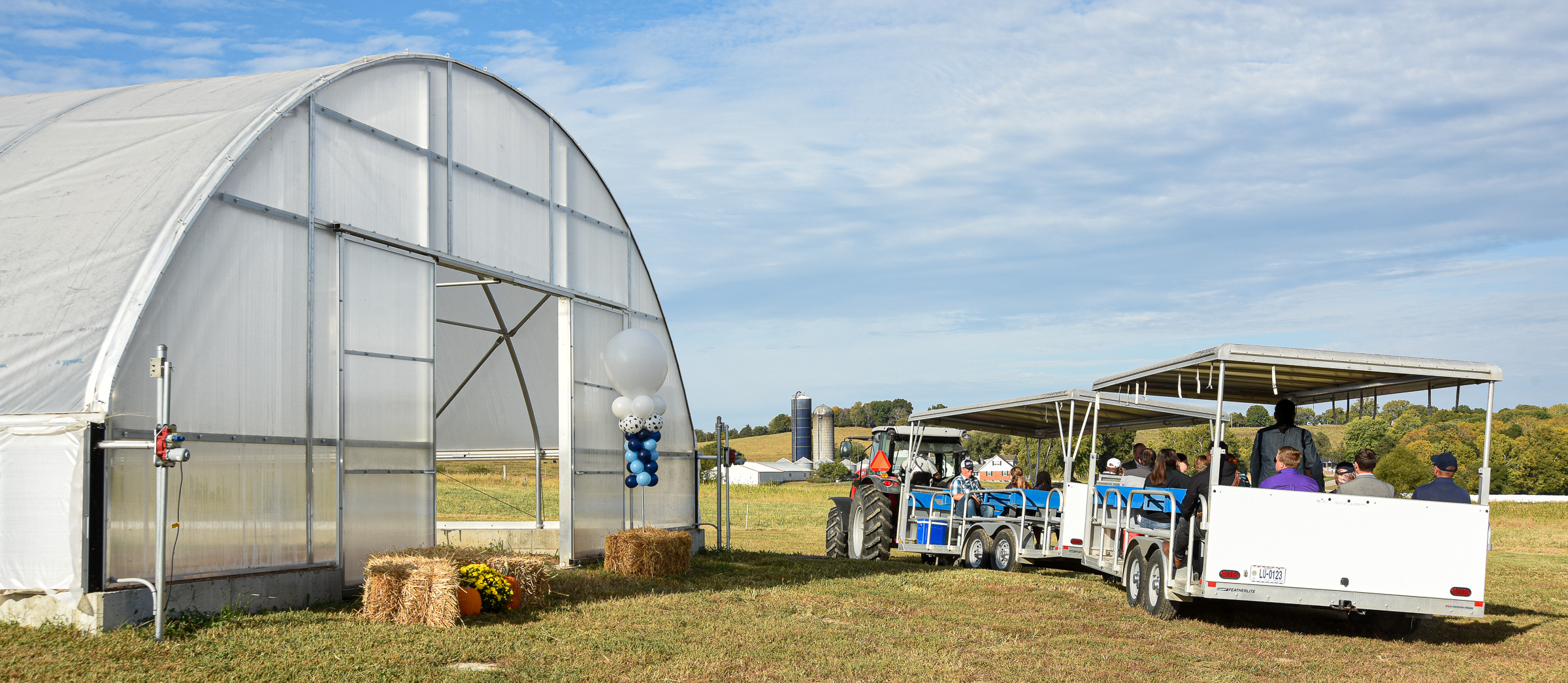 Julie Smith/News Tribune photo: Following a ribbon-cutting ceremony, visitors to George Washington Carver Farm were taken on a tour of the new high tunnels, greenhouses and other buildings on the grounds at the southern Cole County Lincoln University research farm. In recent years, LU has invested greatly into facilities to be able to conduct studies into agriculture.
Julie Smith/News Tribune photo: Following a ribbon-cutting ceremony, visitors to George Washington Carver Farm were taken on a tour of the new high tunnels, greenhouses and other buildings on the grounds at the southern Cole County Lincoln University research farm. In recent years, LU has invested greatly into facilities to be able to conduct studies into agriculture.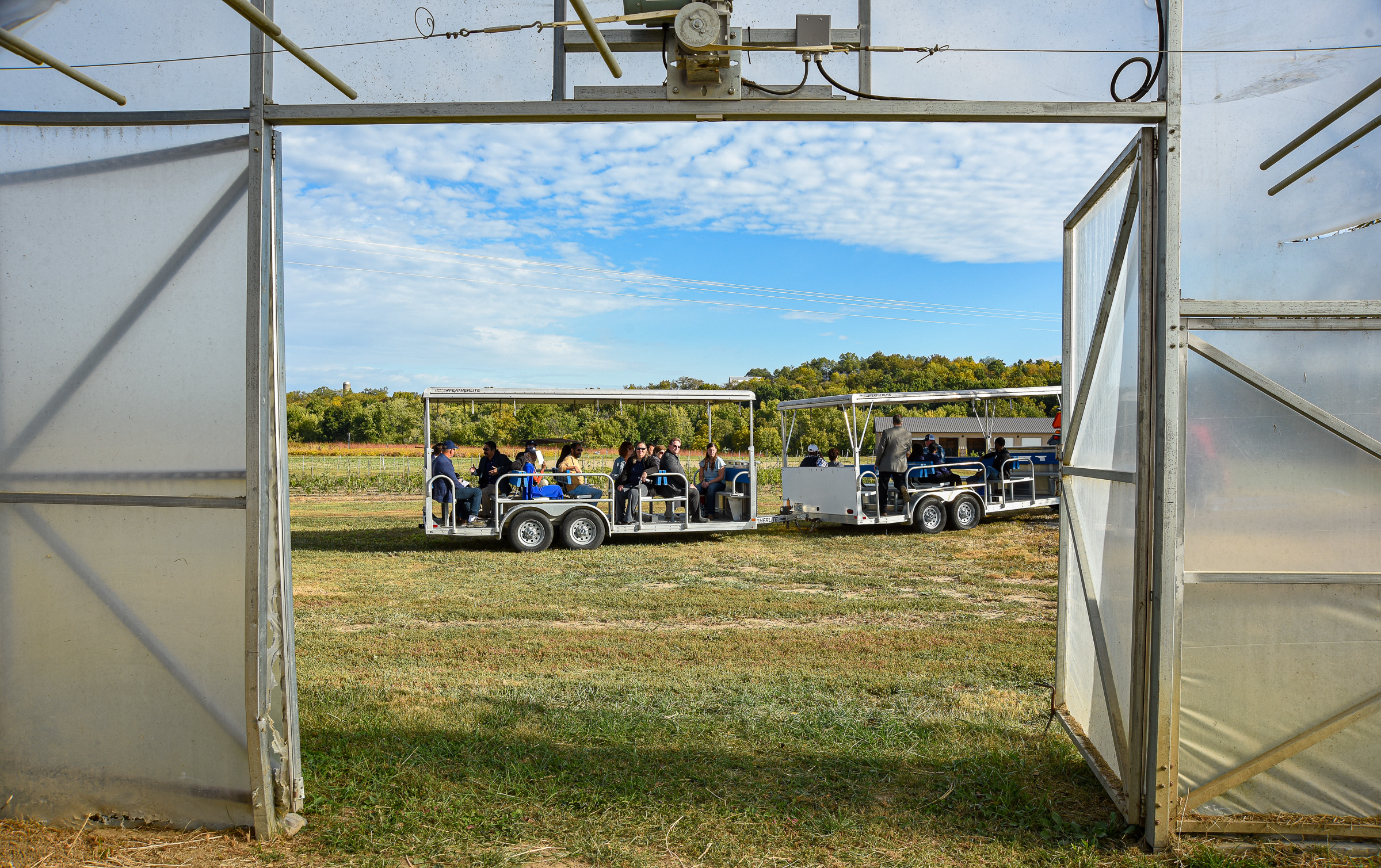 Julie Smith/News Tribune photo: Following a ribbon-cutting ceremony, visitors to George Washington Carver Farm were taken on a tour of the new high tunnels, greenhouses and other buildings on the grounds at the southern Cole County Lincoln University research farm. In recent years, LU has invested greatly into facilities to be able to conduct studies into agriculture.
Julie Smith/News Tribune photo: Following a ribbon-cutting ceremony, visitors to George Washington Carver Farm were taken on a tour of the new high tunnels, greenhouses and other buildings on the grounds at the southern Cole County Lincoln University research farm. In recent years, LU has invested greatly into facilities to be able to conduct studies into agriculture.
